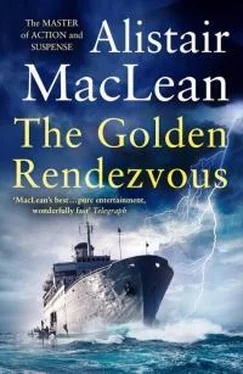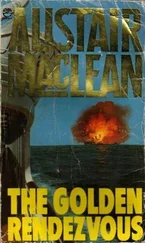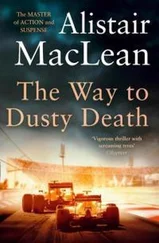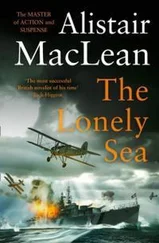“Cerdan!” There was shock and disbelief and utter lack of comprehension in Susan’s voice. “Cerdan! Bound hand and foot and tied to his bed so that he can’t move an inch. Cerdan! But – no, no!” She was ready to give up. “Oh, Johnny, what does it all mean?”
“I know what it all means.” No question now but that I knew what it all meant, and I wished to heaven I didn’t. I’d only thought I’d been afraid before, the time I had only been guessing. But the time for guessing was past, oh, my God, it was past. I knew the truth now and the truth was worse than I had ever dreamed. I fought down the rising panic and said steadily through dry lips: “Have you ever robbed a grave, Susan?”
“Have I ever–” She broke off and when her voice came again there were tears in it. “We’re both worn out, Johnny. Let’s get down below. I want to go back to the sick-bay.”
“I have news for you, Susan. I’m not mad. But I’m not joking. And I hope to God that grave’s not empty.” I caught her arm to lead her away, and as I did the lightning flashed again and her eyes were wild and full of fear. I wondered what mine looked like to her.
IX
Thursday 10 p.m. – Midnight
What with the darkness, my bad leg, the intermittent lightning, the wild rearing, wave-top staggering and plunging of the Campari and the need to use the greatest caution all the way, it took us a good fifteen minutes to reach number four hold, far back on the after-deck. And when we got there, pulled back the tarpaulin, loosened a couple of battens and peered down into the near Stygian depths of the hold, I wasn’t at all sure that I was glad we had come.
Along with several tools, I’d filched an electric lantern from the bo’sun’s store on the way there, and though it didn’t give off much of a light it gave off enough to let me see that the floor of the hold was a shambles. I’d secured for sea after leaving Carracio, but I hadn’t secured for a near-hurricane, for the excellent reason that whenever the weather was bad the Campari had invariably run in the other direction.
But now Carreras had taken us in the wrong direction and he either hadn’t bothered or forgotten to secure for the worsening weather conditions. Forgotten, almost certainly: for number four hold presented a threat, to say the least, to the lives of everybody aboard, Carreras and his men included. At least a dozen heavy crates, the weight of one or two of which could be measured in tons, had broken loose and were sliding and lurching across the floor of the hold with every cork-screwing pitch of the Campari , alternatively crashing into the secured cargo aft or the bulkhead for’ard. My guess was that this wasn’t doing the for’ard bulkhead any good: and just let the motion of the Campari change from pitching to rolling, especially as we neared the centre of the hurricane, and the massive deadweights of those sliding crates would begin to assault the sides of the ship. Buckled plates, torn rivets and a leak that couldn’t be repaired would only be a matter of time.
To make matters worse, Carreras’s men hadn’t bothered to remove the broken splintered sides of the wooden crates in which they and the guns had been slung aboard: they, too, were sliding about the floor with every movement of the ship, being continually smashed and becoming progressively smaller in size as they were crushed between the sliding crates and bulkheads, pillars and fixed cargo. Not the least frightening part of it was the din, the almost continuous goose-pimpling metallic screech as iron-banded cases slid over steel decks, a high-pitched grating scream that set your teeth on edge, a scream that invariably ended, predictably yet always unexpectedly, in a jarring crash that shook the entire hold as the crates brought up against something solid. And every sound in that echoing, reverberating, emptily cavernous hold was magnified ten times. All in all, the floor of that hold wasn’t the place I would have chosen for an afternoon nap.
I gave the electric lantern to Susan, after shining it on a vertical steel ladder tapering down into the depths of the hold.
“Down you go,” I said. “For heaven’s sake, hang on to that ladder. There’s a baffle about three feet high at the bottom of it. Get behind it. You should be safe there.”
I watched her climb slowly down, manoeuvred two of the battens back into place over my head – no easy job with one hand – and left them like that. Maybe they would be jarred loose, they might even fall down into the hold. It was a chance I had to take, they could only be secured from above, and the covering tarpaulin could also only be secured from above. There was nothing I could do about that either. If anyone was crazy enough to be out on deck that night – especially as Carreras had no lifelines rigged – the chances were in that blinding storm that they wouldn’t even notice the flapping corner of the tarpaulin or, if they did, they would only either pass it by or at the most secure it. If someone was curious enough to go to the length of pushing back a batten – well, there was no point in worrying about that.
I went down the hatch slowly, awkwardly, painfully – Marston had a higher opinion of his anæsthetics than I had – and joined Susan on the floor behind the baffle. At this level the noise was redoubled, the sight of those head-high behemoths of crates charging across the hold more terrifying than ever. Susan said: “The coffins. Where are they?” All I had told her was that I wanted to examine some coffins: I couldn’t bring myself to tell her what we might find in them.
“They’re boxed. In wooden crates. On the other side of the hold.”
“The other side!” She twisted her head, lined up the lantern and looked at the sliding wreckage and crates screeching and tearing their way across the floor. “The other side! We would – we would be killed before we got halfway there.”
“Like enough, but I can’t see anything else for it. Hold on a minute, will you?”
“You! With your leg! You can’t even hobble. Oh, no!” Before I could stop her she was over the baffle and half running, half staggering across the hold, tripping and stumbling as the ship lurched and her feet caught on broken planks of wood, but always managing to regain balance, to stop suddenly or dodge nimbly as a crate slid her away. She was agile, I had to admit, and quick on her feet: but she was exhausted with sea-sickness, with bracing herself for the past hours against the constant violent lurching of the Campari : she’d never make it.
But make it she did, and I could see her on the other side flashing her torch around. My admiration for her spirit was equalled only by my exasperation at her actions. What was she going to do with those boxed coffins when she found them: carry them back across the floor, one under each arm.
But they weren’t there, for after she had looked everywhere she shook her head. And then she was coming back and I was shouting out a warning, but the warning stuck in my throat and was only a whisper and she wouldn’t have heard it anyway. A plunging, careening crate, propelled by a sudden viscious lurch as the Campari plunged headlong into an exceptional trough, caught her back and shoulder and pitched her to the floor, pushing her along before its massive weight as if it were imbued with an almost human – or inhuman – quality of evil and malignance and determined to crush the life out of her against the for’ard bulkhead. And then, in the last second before she would have died, the Campari straightened, the crate screeched to a halt less than a yard from the bulkhead and Susan was lying there between crate and bulkhead, very still. I must have been at least fifteen feet away from her but I have no recollection of covering the distance from the baffle to where she lay and then back again, but I must have done for suddenly we were there in the place of safety and she was clinging to me as if I were the last hope left in the world.
Читать дальше
Конец ознакомительного отрывка
Купить книгу












